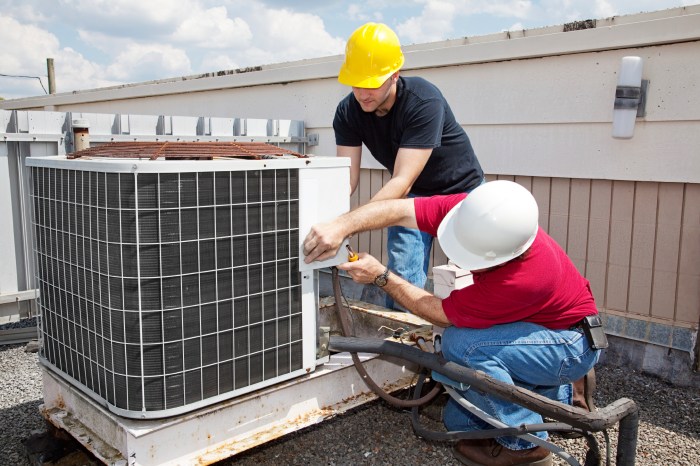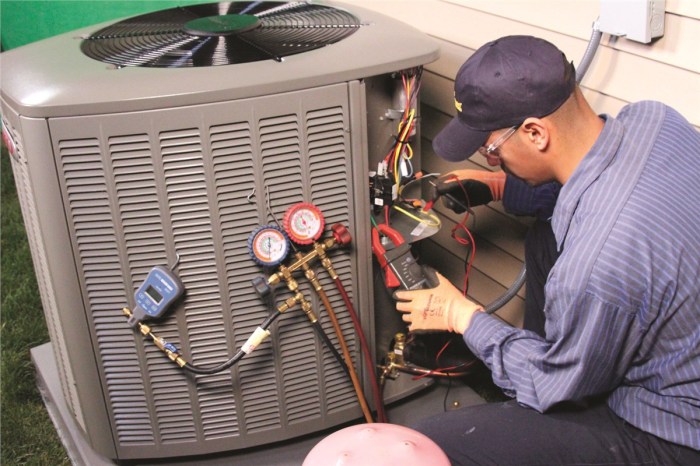Embark on a journey through the world of heat and air conditioning repair, where regular maintenance and expert care play crucial roles in keeping your system running efficiently. From common problems to DIY troubleshooting tips, this guide covers it all to ensure your HVAC system remains in top-notch condition.
Delve deeper into the realm of HVAC maintenance and repair with the following comprehensive information that aims to empower homeowners and enthusiasts alike.
Importance of Regular Maintenance
Regular maintenance for heat and air conditioning systems is crucial to ensure optimal performance and longevity of the equipment. By scheduling routine maintenance, homeowners can prevent major repair issues, improve energy efficiency, and prolong the lifespan of their HVAC systems.
Prevention of Major Repair Issues
Regular maintenance tasks such as cleaning or replacing air filters, inspecting ductwork for leaks, and lubricating moving parts can help identify and address minor issues before they escalate into costly repairs. For example, a clogged air filter can lead to reduced airflow and strain on the system, resulting in breakdowns or component failures.
Cost-Saving Benefits
Investing in regular maintenance not only helps prevent major repair expenses but also saves money in the long run. Well-maintained HVAC systems operate more efficiently, consuming less energy and reducing utility bills. Additionally, catching minor issues early through maintenance can prevent the need for emergency repairs, which tend to be more expensive.
Common HVAC Problems

When it comes to your HVAC system, there are a few common problems that can arise and require professional repair services. Identifying these issues early on can help prevent further damage and ensure the efficiency of your system.
1. Refrigerant Leaks
Refrigerant leaks are a common issue that can lead to reduced cooling capacity and increased energy bills. Symptoms of a refrigerant leak include warm air blowing from the vents, ice buildup on the evaporator coils, and a hissing sound coming from the unit.
2. Dirty or Clogged Filters
Dirty or clogged air filters can restrict airflow, causing your HVAC system to work harder and less efficiently. Signs that your filters need to be replaced include reduced airflow, increased dust in your home, and higher energy bills.
3. Faulty Thermostat
A faulty thermostat can lead to temperature inconsistencies and improper functioning of your HVAC system. If you notice that your home is not reaching the set temperature, or if the system is turning on and off frequently, it may be time to have your thermostat checked.
4. Electrical Issues
Electrical problems, such as faulty wiring or connections, can cause your HVAC system to malfunction or even stop working altogether. If you experience frequent tripped circuit breakers, flickering lights when the system is running, or strange noises coming from the unit, it's important to seek professional help.
DIY Troubleshooting Tips
When facing minor HVAC issues, homeowners can try some DIY troubleshooting tips before calling a professional. These tips can help save time and money by addressing simple problems without the need for professional assistance.
Checking Air Filters
One common issue that can affect HVAC performance is dirty or clogged air filters. To troubleshoot this problem, follow these steps:
- Locate the air filter in your HVAC system.
- Remove the filter and inspect it for dirt or debris.
- If the filter is dirty, replace it with a new one according to the manufacturer's instructions.
- Regularly check and replace air filters every 1-3 months to ensure optimal system performance.
Inspecting Thermostat Settings
Another common problem with HVAC systems can be incorrect thermostat settings. Here's how you can troubleshoot this issue:
- Check the thermostat settings to ensure they are set correctly for heating or cooling.
- If the settings seem off, adjust them to the desired temperature and monitor the system for any changes.
- Consider upgrading to a programmable thermostat for better control and energy efficiency.
Safety Precautions for DIY Repairs
When attempting any DIY repairs on your HVAC system, it's essential to prioritize safety. Follow these safety precautions to avoid accidents or damage:
- Turn off the power to the HVAC system before starting any repairs.
- Avoid touching any electrical components without proper knowledge or training.
- Use protective gear such as gloves and goggles when handling HVAC parts or tools.
- If unsure about a repair task, it's best to contact a professional technician for assistance.
Hiring a Professional Repair Service
When it comes to your HVAC system, hiring a professional repair service is crucial for ensuring efficient and effective repairs. Here are the steps involved in selecting a reputable HVAC repair service.
Qualifications, Experience, and Customer Reviews
- Check the qualifications of the technicians - they should be licensed and certified to work on HVAC systems.
- Look for a company with years of experience in the industry, as this indicates expertise and knowledge.
- Read customer reviews and testimonials to gauge the quality of service provided by the repair service.
Obtaining Multiple Quotes
It is important to obtain multiple quotes before choosing a repair service. This allows you to compare prices and services offered by different providers, ensuring you get the best value for your money.
Repair vs. Replacement

When faced with a malfunctioning heat or air conditioning system, homeowners often find themselves debating whether to repair the existing system or invest in a replacement. Understanding the factors that influence this decision is crucial in ensuring the most cost-effective solution.
Cost-Effectiveness of Repair
Repairing a heat or air conditioning system can be more cost-effective in the following scenarios:
- Minor issues that can be fixed with simple repairs or part replacements.
- The system is relatively new and has not reached the end of its expected lifespan.
- The repair costs are significantly lower than the price of a new system.
Factors to Consider
When deciding between repair and replacement, consider the following factors:
- The age of the system: Older systems may require frequent repairs and eventually become less efficient.
- The frequency of breakdowns: If the system is constantly failing, replacement might be a more viable option in the long run.
- Energy efficiency: Newer models are often more energy-efficient, leading to lower utility bills over time.
- Overall cost: Calculate the total expenses of repairs versus the cost of a new system to determine the most economical choice.
When Replacement is Practical
In certain situations, replacing the heat or air conditioning system is the more practical option:
- The system is outdated and inefficient, leading to high energy costs and frequent breakdowns.
- The repair costs are close to or exceed the price of a new system.
- The system uses outdated refrigerants or technology that is no longer supported.
Epilogue
In conclusion, maintaining a well-functioning HVAC system requires a blend of proactive care and professional expertise. By adhering to the tips and guidelines Artikeld here, you can ensure that your heating and cooling systems operate smoothly, efficiently, and cost-effectively for years to come.
General Inquiries
How often should I schedule maintenance for my HVAC system?
It's recommended to schedule maintenance at least once a year to ensure optimal performance and prevent major issues.
What are some common signs that indicate my HVAC system needs repair?
Unusual noises, inconsistent temperatures, and increased energy bills are common indicators that your HVAC system may require professional repair.
Is it safe to perform DIY repairs on my HVAC system?
While minor maintenance tasks can be done DIY, complex repairs should be left to professionals to avoid safety hazards and further damage.
How do I choose a reliable HVAC repair service?
Look for qualifications, experience, and positive customer reviews when selecting an HVAC repair service. Obtaining multiple quotes can also help in making an informed decision.
When is it better to repair rather than replace my HVAC system?
If the repair costs are significantly lower than replacement and the system is still relatively new, opting for repair may be more cost-effective.
